

Benefit of bees even bigger than thought. Bees have a much greater economic value than is widely known, according to a scientific probe into strawberry-growing published on Wednesday.
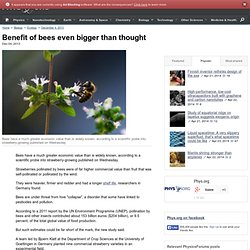
Strawberries pollinated by bees were of far higher commercial value than fruit that was self-pollinated or pollinated by the wind. They were heavier, firmer and redder and had a longer shelf life, researchers in Germany found. Bees are under threat from hive "collapse", a disorder that some have linked to pesticides and pollution. According to a 2011 report by the UN Environment Programme (UNEP), pollination by bees and other insects contributed about 153 billion euros ($204 billion), or 9.5 percent, of the total global value of food production. Interactive Infographic: Meat Production In 2050. Developed countries consume about 40 percent of meat worldwide.
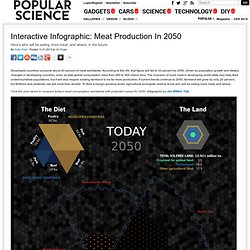
According to the UN, that figure will fall to 30 percent by 2050, driven by population growth and dietary changes in developing countries, even as total global consumption rises from 280 to 500 million tons. Eco-Fruit Farming: Reducing Pesticides while Promoting Best Farming Techniques. In a 2005 study conducted by the Pesticide Data Program (under the US Department of Agriculture), out of 774 apples that were analyzed in the United States, 727 samples detected residues of pesticides - that's a whopping 98%!
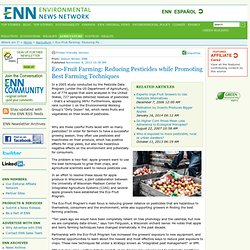
Furthermore, apples rank number 1 on the Environmental Working Group's "Dirty Dozen" list, which ranks fruits and vegetables on their levels of pesticides. An Ingenious Way to Save Half-Eaten Fruit, Without Plastic Baggies. Food Huggers is a line of silicone caps for keeping half-eaten fruits and veggies fresh.
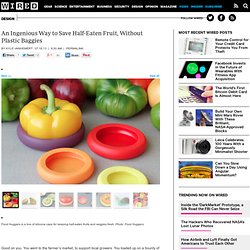
2014TrendForecast.pdf. Is this what we'll eat in the future? Spices Of The Future: Now Manufactured By Yeast? Back in the 1600s, the spice trade played an active role in determining colonial conquests, with wars fought over nutmeg and cloves.

FDA draft risk profile on pathogens and filth in spices. Current pathogen control measures in spices may not adequately protect public health, according to the US Food and Drug Administration (FDA).
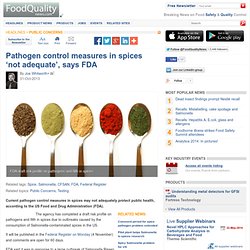
The agency has completed a draft risk profile on pathogens and filth in spices due to outbreaks caused by the consumption of Salmonella-contaminated spices in the US. It will be published in the Federal Register on Monday (4 November) and comments are open for 60 days. FDA said it was in response to a large outbreak of Salmonella Rissen infections in 2008 to 2009 associated with ground white pepper and in 2009 to 2010, a larger outbreak of Salmonella Montevideo infections linked to products containing black and red pepper.
Chickens to benefit from biofuel bonanza. Chickens could be the unexpected beneficiaries of the growing biofuels industry, feeding on proteins retrieved from the fermenters used to brew bioethanol, thanks to research supported by the Engineering and Physical Sciences Research Council (EPSRC).
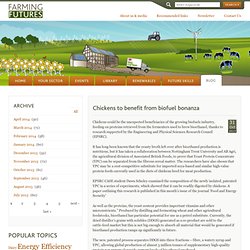
It has long been known that the yeasty broth left over after bioethanol production is nutritious, but it has taken a collaboration between Nottingham Trent University and AB Agri, the agricultural division of Associated British Foods, to prove that Yeast Protein Concentrate (YPC) can be separated from the fibrous cereal matter. World faces global wine shortage - report. 30 October 2013Last updated at 14:07 ET Global wine production peaked in 2004, and is continuing to fall, the report says The world is facing a wine shortage, with global consumer demand already significantly outstripping supply, a report has warned.
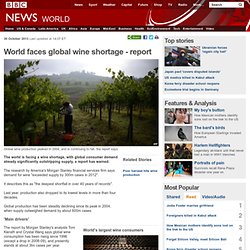
The research by America's Morgan Stanley financial services firm says demand for wine "exceeded supply by 300m cases in 2012". Build Your Own Emergency Meals For The Next Disaster. Less than a mile away from where Hurricane Sandy once engulfed the Staten Island ferry pier and shut down transportation for nearly a week, artist Tattfoo Tan has a small sign posted on his front door.

Year-round English apples 'nearing' English apples could be on the shelves 12 months of the year within the next decade.

That is the view of English Apples & Pears’ chief executive Adrian Barlow, who believes changes in attitude and technology have paved, and will continue to pave, the way to such a development. Barlow relayed his vision to those gathered at the English Apples & Pears’ season launch dinner on Tuesday, including growers who, despite suffering the coldest spring for 50 years, are now experiencing their latest season since 1985. McGill students win $1M for urban food security project. CTV Montreal Published Monday, September 23, 2013 10:56PM EDT Last Updated Tuesday, September 24, 2013 1:12PM EDT A group of McGill students has been awarded $1 million to help create a company that will farm insects. The Hult Prize was awarded to McGill University's Aspire team by former president Bill Clinton Monday evening at an event in New York City.
How carbon nanotubes could save you from spoiled food. Carbon nanotubes – tiny rolled-up sheets of carbon atoms – are one of the most intriguing new materials that could be used in a new generation of electronics. As my colleague Signe Brewster reported on Wednesday, Stanford researchers have created the first carbon nanotube computer, but the material also has a variety of other applications, particularly in the creation of new sensors. Okisto: A new Greek way of getting dinner. 22 September 2013Last updated at 19:40 ET By Theopi Skarlatos BBC News, Athens.